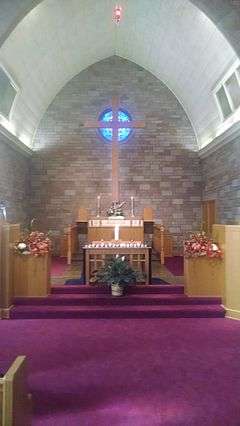Totensonntag
| Totensonntag | |
|---|---|
 A congregation of the United States-based denomination Evangelical and Reformed Church observing Totenfest by lighting votive candles in memory of the faithful departed | |
| Also called |
Ewigkeitssonntag Totenfest |
| Observed by | Christians (Lutheran & Reformed) |
| Significance | Remembrance of the Faithful Departed |
| Observances | church services, praying for the dead, lighting votive candles, visiting cemeteries and graveyards[1] |
| Related to | Allhallowtide (All Hallows' Eve, All Saints' Day, All Souls' Day); Blue Christmas; Thursday of the Dead; Reformation Day; Remembrance Sunday |
Totensonntag (Sunday of the Dead), also called Ewigkeitssonntag (Eternity Sunday) or Totenfest, is a German religious holiday observed mainly in Lutheran churches.
History
In 1816, King Frederick William III of Prussia made his cabinet pass a decree that stated all Lutheran churches in the areas under Prussian rule had to observe the last Sunday before Advent as a "general celebration in memorial of the deceased".[2] Other churches outside of Prussia followed, eventually, as well.
In the United States, some Protestant churches celebrate this service of remembrance as Totenfest.[3] It often coincides with celebration of All Saints Day.
Special protection
Totensonntag is a protected holiday in all German states. The holiday laws of all federal states, with the exception of Hamburg, have special provisions, classifying Totensonntag either as a memorial day or a "silent day" which implies special restrictions.[4] Depending on the state, music may not be played in public venues or only at certain hours, and dancing is forbidden as well (German: Tanzverbot).
See also
References
- ↑ Black, Monica (10 May 2010). Death in Berlin: From Weimar to Divided Germany. Cambridge University Press. p. 34. ISBN 9780521118514.
Totensonntag was an occasion for remembering and praying for the dead and was celebrated by attending church services and making cemetery pilgrimages.
- ↑ RGG, 3. Aufl.; Band VI Spalte 957
- ↑ "Totenfest." http://www.ucc.org/assets/pdfs/totenfest.pdf, accessed 2013-11-20
- ↑ "§ 2(1)III Gesetz über Sonntage, Feiertage, Gedenktage und Trauertage vom 16. Oktober 1953" (PDF). Retrieved 2009-11-21.
Further reading
- Bieritz, Karl-Heinrich (2005). Das Kirchenjahr. Feste, Gedenk- und Feiertage in Geschichte und Gegenwart. Beck’sche Reihe (in German). 447 (Fourth ed.). München: Beck. ISBN 3-406-47585-X.
